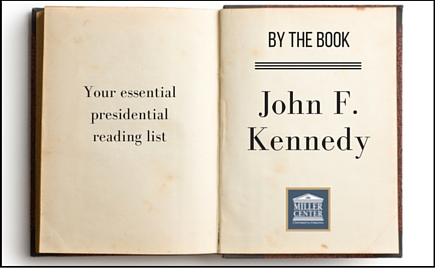By the Book: John F. Kennedy

The first year of a new president’s first term is always a crucible. But often it’s only in hindsight, within the carefully considered pages of an authoritative presidential biography, that the full measure of that first year can be taken. In this new series on the best presidential biographies, Miller Center presidential scholars and experts recommend the ones most worth reading.
Scholarship on John F. Kennedy has run the gamut from admiring, even adoring accounts of life on the New Frontier to harshly critical assessments that charge Kennedy with a recklessness that endangered any and all life as we knew it. This writing, however, has evolved to a point where balanced studies, based on a solid archival foundation, have now become the norm.
Of these volumes, three biographies of Kennedy stand out for their readability and reasonableness. All of them recognize the virtues as well as the vices of JFK, and emphasize the growth that Kennedy demonstrated while in office.
Alan Brinkley’s John F. Kennedy (2012) is the shortest of the lot, offering an engaging and accessible account of the nation’s thirty-fifth president. In under 160 pages, Brinkley covers Kennedy’s upbringing, pre-presidential years, and tenure in the White House, injecting needed proportion into the Kennedy story. Highlighting JFK’s enduring appeal, he sees Kennedy’s strength as being rooted, as much of life is, in timing. Kennedy combined immense political skill and personal charisma with a dynamic vision that meshed neatly with a changing America.
Michael O’Brien John F. Kennedy: A Biography (2005) offers the most voluminous account of Kennedy’s life and presidency. At close to a thousand pages, it addresses Kennedy’s thousand days in office more comprehensively, if perhaps just as redundantly, as studies that came before it. More approachable is O’Brien’s condensed study, Rethinking Kennedy: An Interpretive Biography (2009), which is really more biography than interpretation. Still, it offers thematic chapters on the triumphs and travails of a complicated man.
Robert Dallek’s An Unfinished Life: John F. Kennedy, 1917-1963 (2003) remains the best and most readable account of Kennedy’s life and presidency. His was the first of the modern biographies to make sufficient use, collectively, of Kennedy’s White House tapes, documents in the Foreign Relations of the United States series, and key manuscript openings at the Kennedy Library. Extensive coverage of Kennedy’s health, as well as intriguing disclosures about yet another Kennedy dalliance, captured the headlines upon its publication. Balanced yet on the whole sympathetic, it offers a Kennedy whose inspiration and policy judgment largely outweighed his peccadilloes.
While bookshelves groan under the weight of the Kennedy corpus, two additional studies—of the Kennedy presidency—are worthy of note. Richard Reeves’ President John F. Kennedy: Profile of Power (1994) offers a chronological, almost day-by-day account that narrates the stream of events that Kennedy faced in the kind of swirling fashion in which they slammed into the White House. James Giglio’s The Presidency of John F. Kennedy (2005) offers a more thematic and more scholarly appreciation of JFK’s thousand days in office, and is itself a model of balance and proportion.
Read or watch John F. Kennedy's September 1960 debate with Richard M. Nixon.